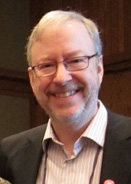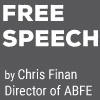- Categories:
Banned in Boston: Mrs. Dennett Arrested
- By Chris Finan
“Free Speech” is a monthly column by Chris Finan, director of American Booksellers for Free Expression (ABFE), that shares his personal thoughts and opinions on a broad range of free expression issues; the views expressed do not necessarily reflect those of the American Booksellers Association. Finan welcomes comments and suggestions at [email protected].

The censors were winning.
By the spring of 1929, Boston had become notorious for its rejection of books that circulated freely in the rest of the country. At least 65 had been suppressed, including works by the philosopher Bertrand Russell and novels by H.G. Wells, Sherwood Anderson, William Faulkner, John Dos Passos, and Ben Hecht.
Most of these books had been dropped by booksellers when the district attorney refused to assure them that the titles could be sold legally. Although the American Booksellers Association had taken a public stand against censorship several years earlier, Boston booksellers insisted that this wasn’t their fight. “Their position as businessmen is one of neutrality,” a spokesman explained. “They are not concerned either with the censorship of public morals or with the defense of art from the assault of puritanism.”
Meanwhile, the police crackdown continued. When Scribner’s Magazine began serializing Hemingway’s A Farewell to Arms in the summer of 1929, the Boston police superintendent banned it. A few months later, the mayor refused to permit a theater to mount Eugene O’Neill’s play Strange Interlude.
“Banned in Boston” became a national catch phrase, symbolizing narrowness and intolerance.
But civil libertarians rallied. Seven hundred protestors rudely challenged city officials during a banquet. The satirical tone of the event was apparent from the beginning as young men and women paraded around the hall dressed in the costumes of characters from the books that had been banned. They circulated a petition calling on authorities to ban a new novel by banned author Percy Marks because being banned in Boston would guarantee a large sale for the book in the rest of the country.
Birth control advocate Margaret Sanger, who had been barred from speaking in Boston on four occasions since 1923, sat at a front table wearing a gag. Her speech was read by Harvard history professor Arthur Schlesinger, who had been the target of censors in other parts of the country.
The highlight of the evening was a skit, “The Suppressed Book Shop,” featuring a bookseller who questions his customers closely. “But why do you want to buy a book?” he asks a woman. “Because I want to be intelligent, even if I do live in Boston,” she replies. The bookseller refuses to sell Mother Goose or Grimm’s Fairy Tales:“Don’t you know that book contains Bolshevik material? Little Red Riding Hood and the Three Little Bears!” He sends his customers off with copies of the telephone book, the Democratic and Republican campaign platforms, and other “safe” titles.
Many Bostonians resented the sometimes patronizing tone of what became known as the “Ford Hall Frolic.” The district attorney played on this sentiment a few days later in convincing a jury to uphold the ban on Theodore Dreiser’s American Tragedy. But the protest had helped bolster the confidence of the beleaguered reformers.
They soon received important support from the American Civil Liberties Union (ACLU), which had remained aloof from the fight over book censorship. At a time when ACLU’s budget was being stretched thin by the effort to defend the right of workers to unionize, its leaders did not believe they could afford to invest in the fight to amend the obscenity laws, which they judged to be less consequential. Most ACLU leaders themselves, and many of their members, were puritanical about depictions of sexual activity. “I am wholly in favor of the censorship of books, magazines, plays, and movies,” a strong ACLU supporter wrote in a letter to national headquarters.
But ACLU was about to change course. The obscenity case that became the turning point did not involve a novel but rather a sex education book. In 1928, a member of the Daughters of the American Republic ordered a copy of Mary Ware Dennett’s pamphlet The Sex Side of Life: An Explanation for Young People and then complained to the post office, which charged Dennett with violating the Comstock Act, the federal anti-obscenity law.
The prosecution of Dennett was widely criticized. The Sex Side of Life, which Dennett had written for her sons 10 years earlier, contained basic information about sexual organs, intercourse, and masturbation, which it discouraged. The book had been distributed privately without causing any protest, and many worried that if it were suppressed, all sexual information was at risk.
The New Republic, while professing little concern about the prosecution of American Tragedy, was outraged when a jury took only 40 minutes to conclude that the pamphlet was “pure and simple smut.” “The conviction of Mrs. Dennett … constitutes a frightful injury not only to a principle, but to the children of this nation and to society itself,” the New Republic wrote.
ACLU intervened strongly in the Dennett case. She was represented by an ACLU attorney and her expenses were paid by a Dennett Defense Committee organized by ACLU. Prominent people lent their name to the committee, including the wife of Marshall Field, the Chicago department store tycoon.
Dennett’s conviction was overturned in 1930. By then, ACLU was deeply involved in the Boston fight. It organized a Massachusetts Civil Liberties Committee (MCLC) and issued the pamphlet The Censorship in Boston, which called for both amending the state obscenity law to allow juries to consider a book as a whole and repealing the theater licensing law that gave the mayor of Boston the power to ban plays.
Roger Baldwin, ACLU’s executive director, entered the fray during a meeting at the Old South Church. ACLU would fight “until all this censorship is abolished in Boston,” he said.
There would be one more outrage against free speech in Boston. The censors were planning to entrap the owner of a beloved bookstore in Cambridge for selling Lady Chatterley’s Lover.
NEXT: Banned in Boston: The Dunster House Bookshop Prosecution.
Previous articles in this series include “How Booksellers Joined the Fight for Free Speech” and “Banned in Boston: The Battle Begins.”


